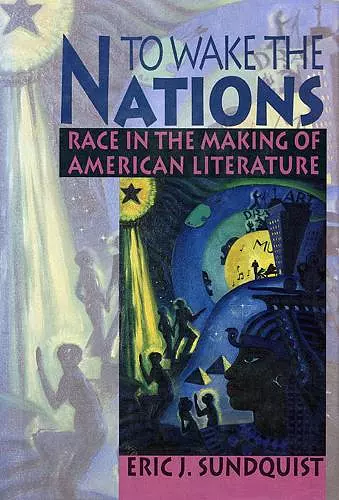To Wake the Nations
Race in the Making of American Literature
Format:Paperback
Publisher:Harvard University Press
Published:14th Aug '98
Currently unavailable, and unfortunately no date known when it will be back

This powerful book argues that white culture in America does not exist apart from black culture. The revolution of the rights of man that established this country collided long ago with the system of slavery, and we have been trying to reestablish a steady course for ourselves ever since. To Wake the Nations is urgent and rousing: we have integrated our buses, schools, and factories, but not the canon of American literature. That is the task Eric Sundquist has assumed in a book that ranges from politics to literature, from Uncle Remus to African American spirituals. But the hallmark of this volume is a sweeping reevaluation of the glory years of American literature—from 1830 to 1930—that shows how white literature and black literature form a single interwoven tradition.
By examining African America’s contested relation to the intellectual and literary forms of white culture, Sundquist reconstructs the main lines of American literary tradition from the decades before the Civil War through the early twentieth century. An opening discussion of Nat Turner’s “Confessions,” recorded by a white man, Thomas Gray, establishes a paradigm for the complexity of meanings that Sundquist uncovers in American literary texts. Focusing on Frederick Douglass’s autobiographical books, Herman Melville’s Benito Cereno, Martin Delany’s novel Blake; or the Huts of America, Mark Twain’s Pudd’nhead Wilson, Charles Chesnutt’s fiction, and W. E. B. Du Bois’s The Souls of Black Folk and Darkwater, Sundquist considers each text against a rich background of history, law, literature, politics, religion, folklore, music, and dance. These readings lead to insights into components of the culture at large: slavery as it intersected with postcolonial revolutionary ideology; literary representations of the legal and political foundations of segregation; and the transformation of elements of African and antebellum folk consciousness into the public forms of American literature.
Sundquist’s book…helps reframe for a new time the questions, moral as well as aesthetic, we need to ask about what constitutes American literature and about what is to be valued in American culture. -- Paul Lauter * Boston Globe *
A major contribution to [the] continuing reconfiguration of the body of American writing. -- A. L. Nielsen * Washington Post *
Nothing less than a full-scale revision of U.S. literary history… To Wake the Nations is an indispensable tool for broadening received conceptions of this nation’s literary history, making them both more comprehensive and, in the most profound sense, more true. -- Phillip Brian Harper * Newsday *
To Wake the Nations will stand as the most comprehensive and conscientious study of its subject that has yet appeared. -- William L. Andrews * American Literature *
Thus instead of literary history that invokes the same, shopworn links between old world and new, readers of To Wake the Nations will discover a not-so-subtle change in the frame of reference from Europe to Africa… This radical reconstruction of American literary history results in a dazzling if somewhat humbling experience for readers schooled in the European tradition. Sundquist’s conscientious scholarship and immense learning set a high standard for future scholars that will not soon be matched. -- Jonathan Veitch * Clio *
To Wake the Nations brilliantly weaves [Sundquist’s] analysis of African American ‘sorrow songs’ with textual material. -- David Yaffe * Bookforum *
A major work of American literary criticism. Comparable in importance to Henry Nash Smith’s Virgin Land and Leo Marx’s The Machine in the Garden. * Choice *
Almost certainly the finest book yet written on race and American literature… [To Wake the Nations] amounts to a startlingly penetrating commentary on American culture, a commentary that should have a powerful impact on areas far beyond the texts investigated here. -- Arnold Rampersad, Princeton University
ISBN: 9780674893313
Dimensions: unknown
Weight: 962g
720 pages